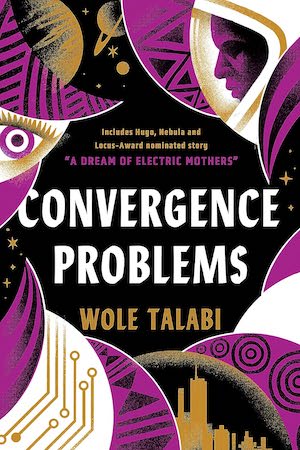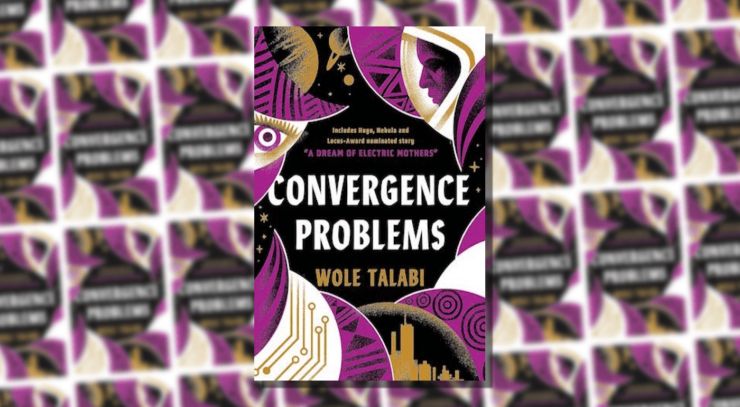(cw: mentions of suicide)
It takes a while to tune myself to the same wavelength as Wole Talabi’s anthology Convergence Problems, which, despite its overall unevenness, does a superb job at giving fresh life to familiar science fiction concepts. His work is filled with a deep connection to Kenya and his home culture—a window into very different micro-worlds that highlight all the anxieties and pitfalls of our all-too-often anthropomorphized relationship with technology. The first short story, “Debut,” chronicles two robots veering off their programmed paths into the world of art. As a trained engineer, Talabi brings a formidable sense of hard technological reality and coolness to his work; for the most part, his prose feels appropriately detached, almost like semi-anthropological reporting on technological phenomena that retains a necessary, dry neatness.
“Saturday’s Song” has better footing—a story-within-a-story rooted in Yoruba religion that speaks to the intimate brutality of family and what comes after. Talabi’s matter-of-factness is a vital part of the story’s cohesion, given its themes of resilience and revenge and difficult decisions that propel his single-minded protagonist, Saura, forward. “Lights in the Sky,” a brief foray into the mind of a far-future space commando, feels mostly generic and forgettable, as do the other ultra-short pieces where Talabi tries his hand at romance (“Gamma,” “Silence,” “The Million Eyes of a Lonely and Fragile God”). “Blowout,” a story about quasi-estranged siblings in a Martian mining disaster, tries to approach the same emotional depth and layers of “Saturday’s Song,” but its focus on action and straightforward reconciliation doesn’t yield the same results.
“Ganger” is where I find myself wholly on board with Talabi’s vision. It’s a longer, more measured piece that follows the personal and political awakening of teen misfit Laide, in a future city divided between “citizen-investors” and an indentured, brain-implanted working class. Laide, who has lived under a hyper-intrusive data surveillance system for her whole life, has never felt comfortable in her own body, or really with her own life; we meet her when she solemnly tries to kill herself, followed by a darkly humorous sequence of events that, to paraphrase Talabi, effortlessly inserts itself between Laide and the death she so desires. There is a truly magnificent sense of bleak comedy and robot-driven physical slapstick in the way Talabi orchestrates his opening scene—an exquisitely-written, tonally complex fragment that burrows deep into my brain.
Buy the Book


Convergence Problems
At times, “Ganger,” like several other stories in Convergence Problems, gets bogged down in over-exposition as Talabi offers us an all-too-familiar tech dystopia born from our current reality. But “Ganger” also does a tremendous job at crystallizing how revolution is born as a small, individual spark; Laide’s story makes a brisk turn away from cliché to self-determination, and here Talabi’s habit of writing abrupt endings helps to frame Laide’s self-radicalization as a process rather than a destination. “Tends to Zero” is another standout story in the collection that hinges on a single character coming to terms with reality; it’s a powerful piece on grief and acceptance with a deceptively, deliberately generic beginning that follows an over-indulgent party night with the dull comfort of a hangover and the protagonist’s simmering depression. Here it really feels like—in conjunction with “Saturday’s Song”—that Talabi has a distinctly powerful strength in modern, quasi-urban fantasy, as the protagonist begins to shrink and waste away. “I am a developing a muscle for erasing myself,” he says, “strengthening it with high-intensity exercise.” This fascinating peristaltic process of self-training, self-conditioning, and self-acceptance forms a common thread across several stories, which feel particularly unique to Talabi’s interests.
It’s probably easiest to first approach Talabi’s work as a series of vignettes, as he favors the equivalent of an Irish goodbye when it comes to wrapping up a story, and for the most part it works very well; “Debut” lends itself especially well to the abrupt, almost editorial/reporting-style end, as well as some of the alternative story formats that take place via document footnotes and changes, or internet forums. Convergence Problems is, overall, a patchy collection, buttressed by a handful of terrific pieces that outshine the others by gigawatts of both style and substance.
Talabi’s prose feels at its best when it leaves us hanging and just a little uneasy, which is why I chose to skim very cursorily over all of the author’s notes that serve as a writer’s post mortem for each story. I would rather analyze and critique stories like “Embers” for what they are on the page. There’s some honest self-dissection here, especially with regard to Talabi’s reluctant attempt at romance, but as the sort of reader who doesn’t want to know more than what the story already gave me, this was the most frustrating portion of the book. (To be fair, I’m not a huge fan of explanatory prefaces, either, and this one goes into great detail about the mathematical concept of convergence problems.) There’s a lot in the notes that feels like a very weird, uncomfortable union of STEM expectations and self-critique, which more often than not detracts from the stories themselves.
Of course the decisions to include these elements in a book are totally subjective. Despite the state of the world right now, Talabi, in his notes, still holds a generally optimistic view of technology and science—he is an engineer after all—and it is through these notes I learned that he used the Google Wordcraft AI to write “Performance Review,” which has, for better or worse, a bizarre dialog fragment (“You this babe!”) that felt like it was missing a piece, or perhaps I’m just ignorant of Lagosian slang. Depending on personal convictions about the use of AI in writing fiction, if you’re interested in the complexities of writers using an amalgamated slurry of other writers’ stolen work to call their own, reading these notes may provoke frustration, withering resignation, or enthusiastic agreement. This is not the place to litigate the fair or ethical use of AI, but it is impossible to glide past this fact when one realizes the full provenance of the art that they are assigned to critique.
Here, your mileage may vary, but for me, this was the end of the road. Talabi doesn’t need an AI to write good stories, and he knows it—in his own words, he participated in a workshop to give feedback to Google Research that will, in an ideal world, empower writers. In the greater context of observing Google’s feckless decline since the halcyon days of “don’t be evil,” it feels more like Google got writers to offer feedback on the presentation and packaging of the trolley machine without changing the fundamental mechanics of who’s getting mowed over by the trolley. I understand that, from an engineering standpoint, it feels cool to participate in these things. But I will never condone using it for producing a piece of writing. “Performance Review” is a middling story at best, and if using AI, which he jokes is “a bit like writing science fiction while living it,” was such a godsend, you would think that someone who so capably crafts tech dystopias and ecologically ruined hellscapes would recognize the many problems of using AI for shits and giggles, with only the equivalent of a small, cheery footnote for disclosure. It is a disappointment, and unfortunately, one that isn’t going to go away any time soon.
Convergence Problems is published by Astra.










